|
-
25th August 12, 04:17 AM
#51
 Originally Posted by gilmore

Jewish Scots, especially in the Glasgow area, have been wearing Gordon tartan kilts for around one hundred years. If you are interested, there are several threads on it here on X Marks, with photos.
Hmmm, I work in Glasgow and this is news to me. The Glasgow Jewish Association and Jewish lads association have been wearing No.1 (Black Watch) tartan since before WW1.
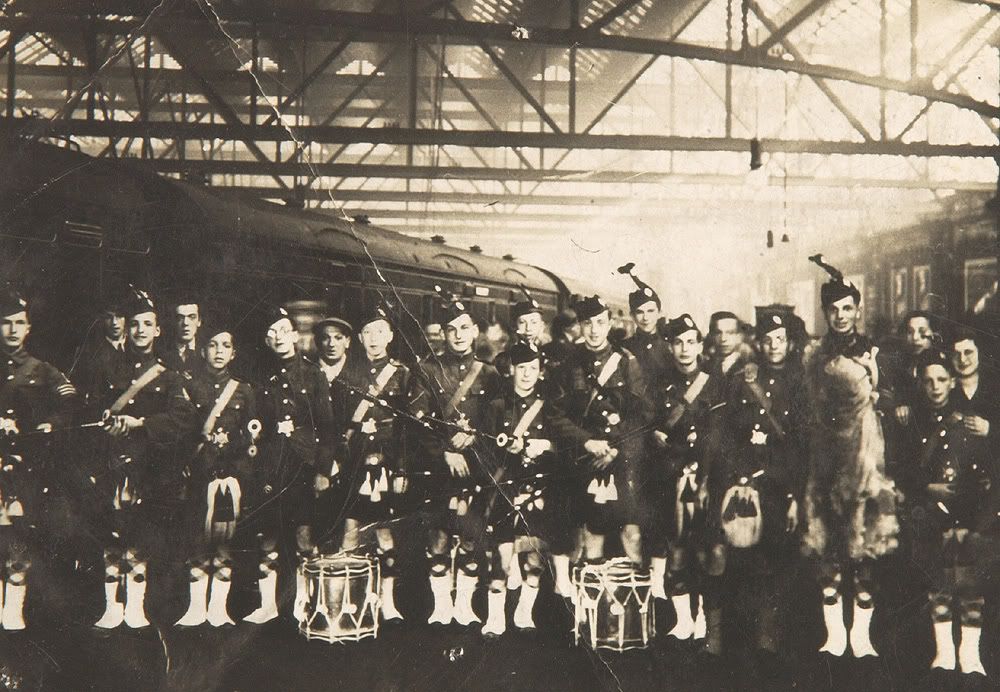
Others do wear the Royal Stewart, I remember the Glasgow Jewish Lads boxing club members wearing Royal Stewart shorts and gowns. Some were members of the College of Piping in Otago St, and wore Royal Stewart kilts. One was quite well known in the boxing world, Vic Herman, and used to pipe himself into the ring. Vic was a very accomplished artist too.
They were tremendously proud of being both Scottish and Jewish. I really do love the sense of humour too, it manages to somehow get the best of both Scottish and Jewish dry observant wisecracking blended very well. There used to be a good one going around Glasgow about Robert Downey Jr, who is of Scottish-Jewish extraction. I'd be interested in seeing the other threads, if you could provide links, please. 
-
-
25th August 12, 10:55 AM
#52
I had read here that the Jews of Glasgow had adopted the Gordon. So I wrote a couple of Rabbis in Glasgow to inquire if this were true. The answer I got back was, yes, this was more or less true. Most of the Jews in their respective congregations wore the Gordon, and have for as long as anyone can remember. I'm guessing based on the post above this one, that certain organizations may have adopted other tartans, but for the generally unaffiliated, the Gordon is most common.
-
-
25th August 12, 11:31 AM
#53
 Originally Posted by MacSpadger

Hmm, I think that the story of Clan Morrision comes from at least 3 different strands. First of all there are what is probably the most common branch, those who are descendents of a man or men whose name was Maurice, which was hugely popular in Medieval times. This branch is based in Aberdeenshire, (I am from there and have several Morison ancestors. The name was written with one R until very recent times, although some still use it that way).
The West Coast/Hebridean branch settled in Skye and Mull as bards under the patronage of the chiefs of Clan MacLeod (around 1600)and MacLean of Duart (around 1612) respectively. The original Gaelic spelling for this family was Ó Muirgheasáin, as they were from the North of Ireland where they had previously held bardic positions for the O'Neills.
The Isle of Lewis branch claimed descent from the King of Norway, and in Scottish Gaelic the spelling was Mac Gille Mhoire, which is probably closer to what you refer to. This clan seemed to disperse after 1613, following a huge defeat by Clan MacAuley after years of inter clan warfare, and it was declared in the 19th century that it was impossible to trace their descendants.
Although apparently not related, these 3 families were declared a united clan under one chief by the Lord Lyon in 1965. So,
Mac Gille Mhoire was the original Gaelic name of one branch only of the Morrisons, the branch where, so far, no descendants have been traced.
That is all consistent with what I have read. The Clan Morrison Society of North America describes
the Norway connection as a popular tale and recognizes other origins of the name. The Lord Lyon provided for regional chiefs for branches of the name but I only know of one that has been named. The big tent concept works well in North America where it would be difficult for folks to accurately identify their branch in many if not most cases. I imagine those in Scotland know which branch they are in and could put forward a regional chief if they were so inclined. You are in a better position than I to judge the need or motivation for doing so, or lack thereof.
Last edited by McElmurry; 25th August 12 at 11:33 AM.
-
-
26th August 12, 03:30 AM
#54
 Originally Posted by ScotFree

I had read here that the Jews of Glasgow had adopted the Gordon. So I wrote a couple of Rabbis in Glasgow to inquire if this were true. The answer I got back was, yes, this was more or less true. Most of the Jews in their respective congregations wore the Gordon, and have for as long as anyone can remember. I'm guessing based on the post above this one, that certain organizations may have adopted other tartans, but for the generally unaffiliated, the Gordon is most common.
Hmm, this does not tally with my daily observations in Glasgow, and I work very near to the Garnethill Synagogue. Outside of the likes of Black Watch wearing Jewish Association and the Jewish Lads Association, around 1200 Glasgow Jews signed up for the army in WW1 and were assigned to the battalions of the H.L.I that wore either Black Watch or Seaforth MacKenzie tartan. There is a photo of some of them in the HLI museum in Sauchiehall St assembled outside the South Portland Street Synagogue in the Gorbals.
To the right you can see Black Watch and HLI Jewish servicemen, to the left Argyll and Sutherland Highlanders Jewish servicemen.
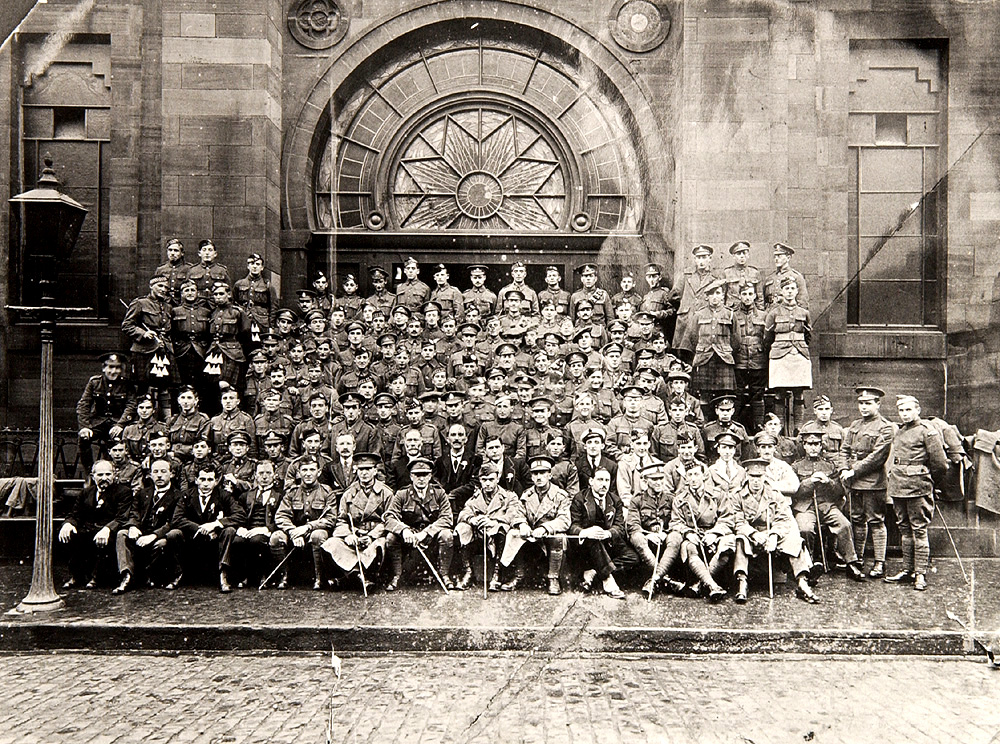
I have found only one reference to Jews in Glasgow wearing Gordon tartan, and that is from archives connected to a man named Joseph Gordon who married Jeanie Cohen in 1901 at Kelvin Synagogue in Glasgow. His children were brought up not knowing they were Jewish, I have absolutely no idea why. They presumed they were members of Clan Gordon and were descended from the faith of the Gordons, which was Catholic. There are no records to indicate that they were practicing Catholics. They had kilts made up in the Gordon tartan, It wasn't until Joseph died in 1971 that they discovered any Jewish connection. This topic is of great interest to me. I work for Glasgow City Council in the museum sector in an area that looks specifically at the history of integrations of different religions into the Glasgow area, and the resulting differentiations in culture that was brought about.
I'll contact the Scottish Jewish Archive at Garnethill Synagogue and see if I can find out more. It must be some interesting tale how the tartan of a regiment from the very North East of Scotland got to be associated with Jews living nearer the South West. I've not actually seen this myself, so it could be an eye opener. If you could let me know who you spoke to, that would be a very great help, thanks! 
There is, of course the actual Jewish tartan. This is most definitely the tartan worn by Glasgow's well known Rabbi Mendel Jacobs.
Last edited by MacSpadger; 26th August 12 at 04:15 AM.
-
-
26th August 12, 03:53 AM
#55
As an addition to my post above, this picture comes from the aforementioned Scottish Jewish Archive at Garnethill Synagogue. It shows 4 members of the 93rd Norman Boy Scouts group, at the opening of the Jewish Scout Hall in Queen's Drive on Sunday 1 June 1958. It appears to be 4 different tartans, left looks like Black Watch, 2nd possibly Seaforth MacKenzie, 3rd possibly Gordon, (but if it is Gordon the sett is about half the size as to what you'd expect to see, I would not think it was Gordon, but your guess is as good as mine), 4th, unknown.
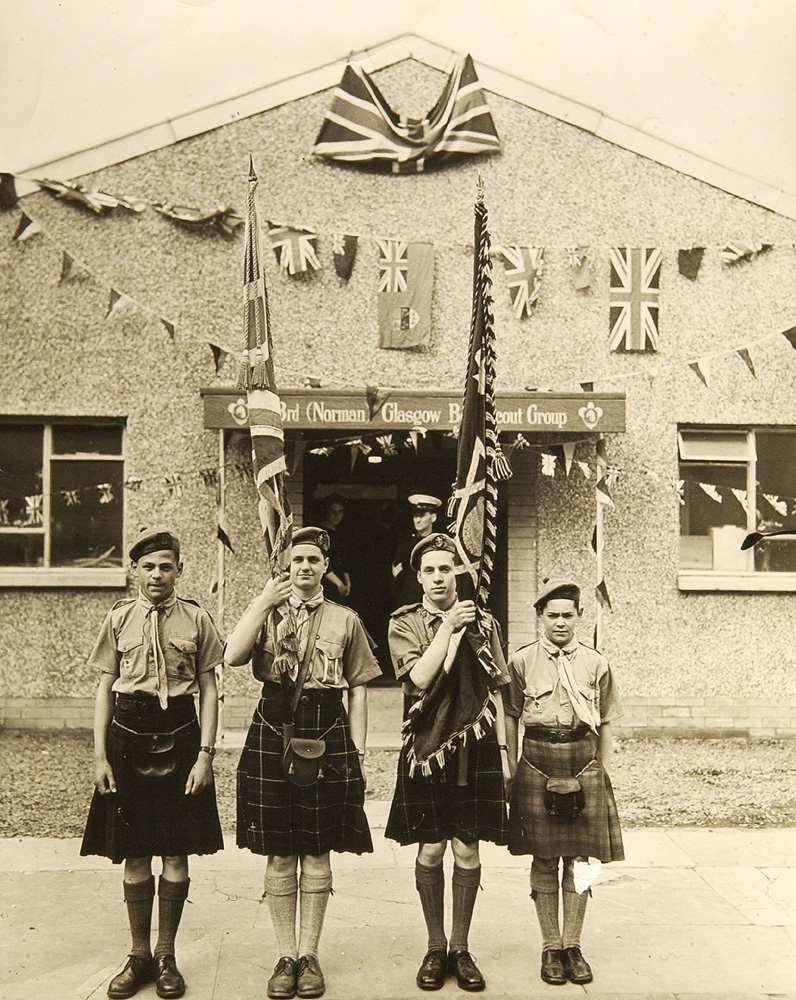
From the picture below, again from the Scottish Jewish Archive at Garnethill Synagogue, it would appear that there just seems to be as much a mixture of tartans as anywhere else in Scotland, of any denomination.
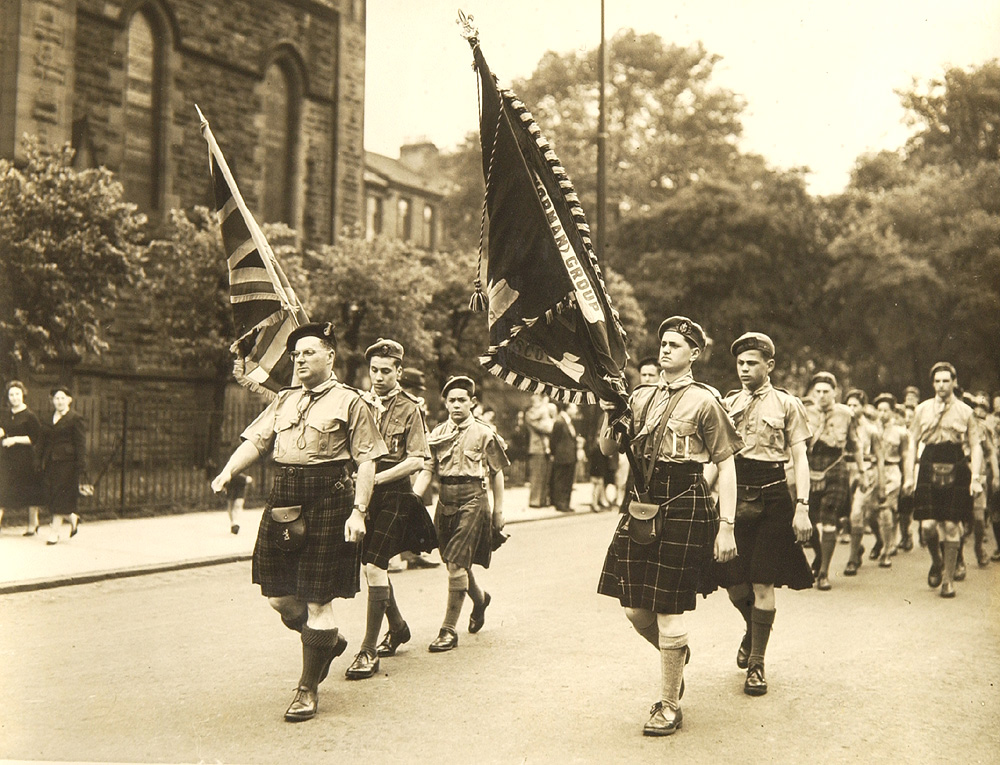
More Glasgow Jewish Scouts, again as many different tartans as you'd see anywhere in Scotland.
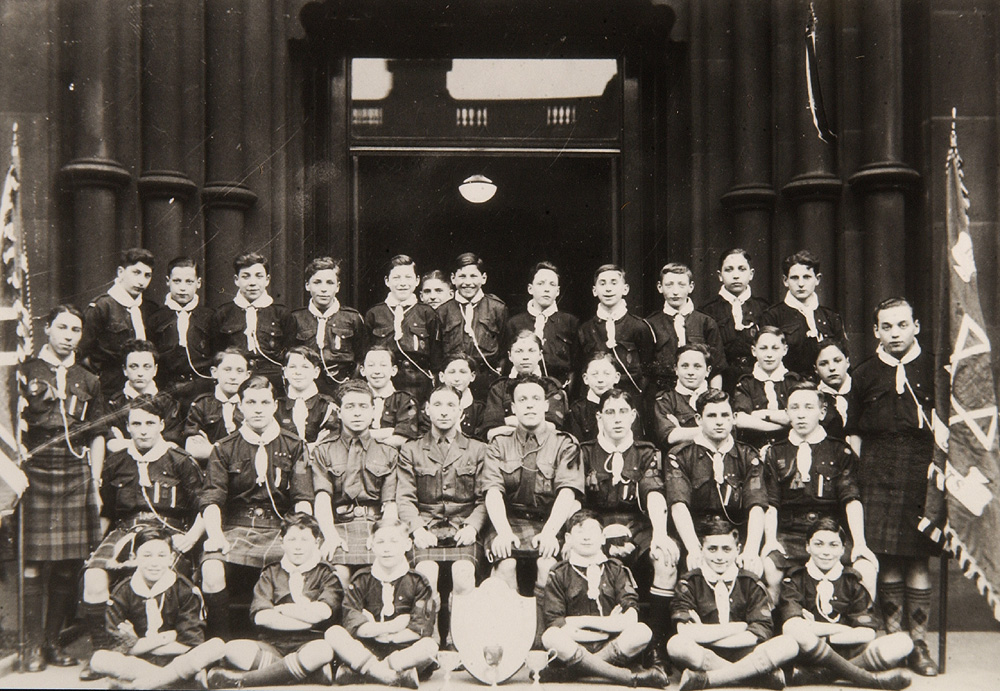
Last edited by MacSpadger; 26th August 12 at 04:28 AM.
-
-
26th August 12, 07:25 AM
#56
 Originally Posted by MacSpadger

If you could let me know who you spoke to, that would be a very great help, thanks! 
There is, of course the actual Jewish tartan. This is most definitely the tartan worn by Glasgow's well known Rabbi Mendel Jacobs.
I'll see if I can dig that up. It wasn't the Rabbi that told me that, but rather he forwarded me on to a member of the congregation that was more of an expert in these things. He was the one that mentioned it. It was a while ago. I'm familiar with Rabbi Jacobs and his new Jewish tartan. Its really a beautiful sett, and lots of symbolism. I rather like it a great deal. I should see if the good Rabbi's organization has lengths of cloth for purchase. It would make a nice kilt. Gordon, is not an uncommon Jewish sir name. No doubt Anglicized from something or somewhere Eastern European. One of the Rabbi's I communicated with mentioned that several families in his congregation bore the sir name Gordon, but they didn't claim any relation to the Scottish House of Gordon (interesting that they tend not to refer to themselves officially as a clan, but rather a house). I know several Jewish Gordon families here in Chicago ... none of them related to each other or the Gordons of Scotland. Common wisdom says that there was an influx of Jews from the city of Grodno in I believe Lithuania or Byelorus. Many of them when forced by the Czar in the late 1800's to adopt sir names, if they chose the name Grodno for the city they lived in, I can see how Grodno became Gordon in Scotland and the US. Interestingly, the word "gorod" in Russian just means "city".
-
-
26th August 12, 08:08 AM
#57
Thank you for the information. Another train of thought is that there might have been some predeliction towards the name Gordon because Lord George Gordon, brother of the 4th Duke of Gordon, converted to Judeaism in 1787, taking the name of Yisrael bar Avraham Gordon.
The marriage of Joseph Gordon in 1901 at Kelvin Synagogue certainly shows the name to be in use for quite some time.
-
-
26th August 12, 09:35 AM
#58
 Originally Posted by MacSpadger

Thank you for the information. Another train of thought is that there might have been some predeliction towards the name Gordon because Lord George Gordon, brother of the 4th Duke of Gordon, converted to Judeaism in 1787, taking the name of Yisrael bar Avraham Gordon.
The marriage of Joseph Gordon in 1901 at Kelvin Synagogue certainly shows the name to be in use for quite some time.
I've read a couple of apocryphal accounts regarding His Grace's brother. It is possible he became, at one time, a bit of a cultural hero for Jewish expats from the Russian Empire. I also remember reading that he bopped around Eastern Europe for a bit before his imprisonment and subsequent conversion in Harrogate Prison (if memory serves). He may have had some influence on those families and towns he encountered on his travels.
Sorry, the email from the good Glaswegian Doctor remains elusive. I'm still searching.
Other than the brother, I have not been able to find any other connection between the Gordon Dukedom and the Jewish communities. I wonder if the Duke had anything to do with helping the resettling of Jewish communities during the shufflings and evictings of Jews in Russia during the 1800's and early 1900's. It is my understanding that Glasgow has the largest of the Jewish communities in Scotland.
-
-
26th August 12, 10:23 AM
#59
It is interesting to note that the "Gordon story" is never mentioned by the late Dr. David Daiches, the noted Burnsian and son of the Chief Rabbi of Scotland, The Rev. Dr. Salis Daiches, in his memoir, Two Worlds : An Edinburgh Jewish Childhood. Both men were proud of their connections both the Jewish community and Scotland in general.
T.
-
-
26th August 12, 10:43 AM
#60
 Originally Posted by ScotFree

It is my understanding that Glasgow has the largest of the Jewish communities in Scotland.
Yes, that's correct, there are 10 synagogues in Scotland, 7 of which are in Glasgow. Jewish migrants started arriving from the Lowalnds and Germany during the Napoleonic Wars. One of them was Isaac Cohen who became Burgess in 1812. By the outbreak of WW1, the Jewish population of Glasgow was 12,000, but this number increased by to 19,000 by 1919. These days it's around 7000 for Scotland in it's entirety and many synagogues closed in Glasgow.
As you will know, it was common practice for many immigrant Jews to here to take on Scottish surnames, the film makers Kevin and Andrew MacDonald, the artist Scotty Wilson, author Muriel Gray, etc, may appear to have Scottish names but are in fact children of Jewish immigrants. Scottish Jewish descendents with names that sound more Scottish include Robert Downey, Jr and Simon Cowell.
Our Glasgow comedian Arthur Brown revealed his birth name was Abraham Arnold Lizerbram, and he was both Scottish and Jewish, "Two stereotypes for the price of one". 
So although Jewish immigrants adopting Scottish surnames is nothing new, I am unaware of any links between the House, or indeed the Duke of Gordon and the Jews of Glasgow. They are really almost at opposite ends of the country from one another. I work for Glasgow Museums in an area that investigates the historical integration of cultural and religious identities in the city, so the subject is of interest to me.
-
 Posting Permissions
Posting Permissions
- You may not post new threads
- You may not post replies
- You may not post attachments
- You may not edit your posts
-
Forum Rules
|
|























Bookmarks